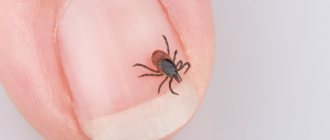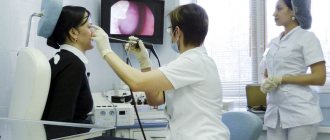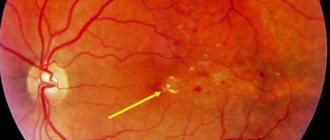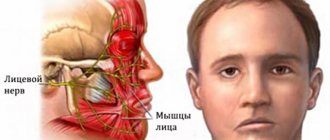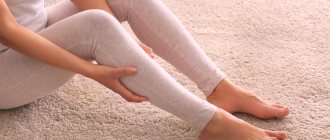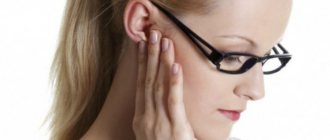Past ENT diseases can cause ear inflammation, which is accompanied by pain and discomfort. Otitis media most often occurs in children of preschool and school age. This is due to the structural features of the child’s ear and weak immunity. Otitis media in a child is accompanied by severe pain, anxiety and fever. But the disease is also common among adults. Inflammation can develop in different parts of the ear - middle, outer or inner.
An acute inflammatory process must be treated immediately, as the infection can spread inside the skull, leading to serious complications such as meningitis or brain abscess. To avoid the unpleasant consequences of pathology, you need to consult an otolaryngologist and undergo a full examination.
Causes and course of the disease
Currently, not much is known about the causes of Meniere's disease.
All currently known causes of Meniere's disease can be divided into local, which relate directly to the middle and inner ear, and general, which relate to various pathologies of the whole organism as a whole. Local reasons include:
- dysfunction of the endolymphatic duct - a channel that extends from the labyrinth towards the temporal bone and is a blindly ending duct;
- formation of new vessels inside the endolymphatic sac;
- reduction in size and closure of the vestibular aqueduct (canal in the inner ear);
- reduction in the number of air cavities (cells) in the temporal bone.
Common reasons include:
- circulatory disorders;
- violation of water-salt balance in the body;
- allergic reactions to various compounds;
- hormonal disorders.
Meniere's disease is based on vascular spasm or dilatation, as well as their weak and permeable walls. As a result, the inner ear swells and begins to put pressure on the walls of the labyrinth. In turn, disturbances occur in the labyrinthine fluid at the biochemical level.
As a result, all components of the inner ear expand and increase in size. Due to the increase in fluid volume, the labyrinth stretches, the internal elements of the ear are displaced or damaged. This problem also includes a violation of vascular autonomics, controlled by the central nervous system.
Causes of ear inflammation
In most cases, bilateral otitis media appears as a result of the development of pathogenic microorganisms in the ear. They enter the human body through dirty water, which contains pathogens, or through mechanical damage. Another reason is the patient’s previous ENT diseases. As the disease progresses, the amount of mucus increases and interferes with the ventilation of the tympanic cavity. The cells of the tympanic cavity, in turn, begin to secrete inflammatory fluid.
Otitis externa often develops due to poor ear hygiene. Sulfur acts as a protective barrier against bacteria, so washing your ears too often leads to the development of the disease, as does poor cleanliness. Under no circumstances should you clean your ears with sharp objects, as there is a high probability of damaging the eardrum and introducing germs into the wound.
Clinical picture
Meniere's disease occurs in several stages.
Initial stage. Periodically, the patient experiences tinnitus and a feeling of ear fullness. Then there comes a feeling of swelling inside the ear, and, as a result, the patient feels constant pressure on it. If treatment is not undertaken, then a picture of sensorineural hearing loss develops, a disease in which the auditory nerve is affected and hearing loss occurs. In addition, due to an increase in intralabyrinthine pressure, dizziness and vomiting begin to bother, which can last for several hours, with intense hearing loss. But these are the most initial and weakest manifestations of the disease.
Second stage. Dizziness and vomiting become frequent and occur in the form of attacks, during which significant hearing loss constantly occurs. But in the second stage, the hearing loss is persistent and after the end of the attack, hearing is not restored to the original level. The same goes for noise and ringing in the ears. In the second stage, tinnitus and a feeling of fullness do not occur periodically, but are constantly present.
Stage three: For those who do not take any steps to treat, Meniere's disease becomes irreversible. Dizziness and vomiting will no longer be observed, and upon examination, it will be impossible to detect fluid inside the labyrinth. However, hearing will be progressively lost, and it will no longer be possible to restore it. Hearing loss occurs as a type of sensorineural hearing loss. As a result of irreversible changes in the labyrinth, stability and firmness of gait are lost, which can no longer be restored.
How to understand the cause of ear pain
Ear pain causes unbearable discomfort. Tolerating it is not only difficult, but also dangerous to health. Regardless of what disease caused the discomfort, it requires urgent treatment. There are many ways on the Internet to get rid of ear pain at home. However, their effectiveness is questionable. And even if you manage to eliminate the pain, the cause of the pain may remain. The result of self-medication can be the addition of an infection, the appearance of purulent processes and other pathologies.
Often, after self-medication, patients still have to see a doctor, when the problem has to be solved surgically. Treatment and recovery in such situations is quite lengthy, expensive and painful.
Medicine knows a huge number of cases when a patient hesitates to see a doctor. As a result, he partially or completely loses his hearing. Don't become part of the negative statistics. Come to the Kutuzovsky Treatment and Diagnostic Center to receive high-quality medical care and prevent complications from occurring.
There are quite a lot of diseases whose symptoms include otalgia. It is better to understand the cause and understand the patient’s complaints. To make a preliminary diagnosis, the otolaryngologist can help with additional information about:
- Rate of occurrence of complaints. So, an acute, shooting pain in the ear that appears literally suddenly indicates an acute infection, inflammation of the auditory tube or eardrum. A gradual increase in the intensity of sensations is characteristic of otitis media, which occurs from a runny nose and nasal congestion.
- The nature and severity of pain. Dull, aching pain is a sign of chronic disease. Severe pain that appears and goes away on its own, repeats periodically, may indicate neuralgia. Pulsating and sharp pain occurs with acute inflammation of the ear canal, boils.
- Duration. Severe pain that does not subside for several days is a symptom of acute inflammation. The pain from the injury will go away after a few hours, but chronic processes and tumors make themselves felt with constant discomfort.
- Localizations. Otalgia can literally bother you “from inside” the head - in this case, the middle ear is affected. For superficial pain, the cause is in the auricle or ear canal.
- Variability. The intensity of pain can change with pressure on the auricle, lobe, change in body position, and swallowing.
- Additional symptoms. The doctor will definitely ask about other complaints - sore throat, nasal congestion, headaches, fever, discharge from the ears, skin changes, hearing loss, and others.
Determining the cause of ear pain begins with an examination by a specialist. In many cases, a doctor can make a diagnosis based on a combination of symptoms. However, often additional studies are required to determine the type of pathology and the degree of its development. At the Kutuzovsky Treatment and Diagnostic Center you can perform examinations of any complexity. The clinic is equipped with high-tech diagnostic equipment. Thanks to the use of modern examination methods, we are able to accurately determine the cause of pain and select the optimal treatment regimen.
By making an appointment, you can do all the necessary procedures directly at the medical center. There is no need to waste time traveling to other medical institutions. We use safe and painless research methods. Come for an appointment at the Kutuzov Diagnostic and Treatment Center to find out the cause of your pain and discuss treatment options.
All these symptoms help the doctor understand the nature and characteristics of the disease. The diagnosis can be confirmed and clarified using more precise procedures:
- Otoscopy is an examination of the ear using a special ENT instrument similar to a funnel. The procedure is painless and allows you to examine the ear and take a sample of discharge (if any) for laboratory analysis.
- Laboratory tests - bacterial culture of microflora, determination of the sensitivity of microorganisms to antibiotics.
- Ultrasound - used to assess the condition of neighboring internal structures - lymph nodes and others.
What diagnostic methods will be needed in a particular case is decided individually by the ENT doctor.
Diagnostics
Meniere's disease consists of several stages.
- The patient's complaints of systematic dizziness and poor health are carefully studied, and when examining the labyrinth (additional research), the otolaryngologist discovers swelling of the walls of the inner ear and accumulation of fluid inside the labyrinth (endolymphatic hydrops).
- A caloric test is performed - this is a study of the vestibular apparatus. The doctor evaluates involuntary eye movements (nystagmus) by pouring water into the ear, or by exposing the eardrum to cold and hot air, thereby irritating it.
- Also, the ENT doctor should send the patient an additional test - MRI (magnetic resonance imaging) of the brain and temporal bones, which is a very informative study for this disease;
- Among additional methods, it is necessary to examine hormonal levels, levels and possible metabolic disorders;
- Instrumental research methods include otoscopy and videotomicroscopy - examination of the external auditory canal and eardrum using an otoscope and a diagnostic ear microscope.
Thus, the otolaryngologist conducts not only an examination of the ear, but also other organs and body functions in order to exclude other diseases. Among them there may be many diseases of the nervous system, which are also characterized by dizziness and other disorders of the vestibular system. These are diseases such as acoustic neuroma, leptomeningitis of the cerebellopontine triangle, specific labyrinthitis and other forms of labyrinthitis.
Friends! Timely and correct treatment will ensure you a speedy recovery!
In addition, when diagnosing Meniere's disease, the otolaryngologist determines the stage of the disease and the degree of hearing impairment.
How will we treat?
If you suspect BPPV, it is best to consult an otoneurologist. These doctors have special techniques for identifying the disease and can conduct a competent examination by doing provocative tests for BPPV. During them, the doctor changes the position of the patient’s body in a special way to understand whether any movements cause an attack of dizziness.
In some cases, if the doctor has the appropriate skills, such tests can be performed by an ENT specialist, neurologist, general practitioner or therapist.
Treatment for BPPV consists of so-called therapeutic and rehabilitation maneuvers. As with provocative tests, the doctor moves the patient’s head, but at the same time has a different goal - not to provoke an attack, but to return the calcium crystals to their place.
Subsequently, such exercises can be performed by the patient himself, but this can only be done after consultation with a specialist, because the technique and frequency of repetitions is determined based on the situation of this particular patient.
But drug support for BPPV, as a rule, is not required. In extremely severe situations, surgical treatment is possible, but this is extremely rarely required!
Vestibular gymnastics. How to cope with dizziness Read more
Treatment
Treatment for Meniere's disease is as follows:
- Intravenous drips with 5-7% sodium bicarbonate, 100-150 ml. The speed should be quite high - about 120 drops per minute (the norm is 1 drop per 1 second.) The number of such droppers can vary from 1 to 15, depending on the severity of the condition and the stage of the disease.
- Taking B vitamins, as well as Aevita (vitamins A and E), Belloid (ergot alkaloids) and Bellataminal, which is a sedative.
- A 20 ml Glucose solution can be injected intravenously in a slow stream. The number of intravenous infusions will depend on the severity of the patient’s condition and the stage of the disease at which he presented.
- Since attacks of Meniere's disease are associated with dizziness and an unstable, shaky gait, during them it is necessary to maintain complete rest and inject a subcutaneous solution of atropine sulfate in the dosage prescribed by the ENT doctor.
- Reflexotherapy is also used to treat Meniere's disease: acupuncture massage, electro-apuncture, magnetic apuncture and other types of acupressure on certain areas of the human body.
- If drug treatment and reflexology do not bring the desired results (which happens only in rare cases), then treatment of Meniere's disease is carried out by surgical intervention in the labyrinth located in the inner ear of a person. It must be carried out in an ENT hospital, followed by a mandatory rehabilitation period.
Prevention
Due to the unclear etiology of Meniere's disease, its prevention is almost impossible.
However, in some cases, measures to prevent the disease can still be taken. This:
- quitting smoking, which leads to poor circulation and hypoxia of the whole body;
- the use of personal protective equipment when riding a motorcycle or bicycle (helmet, motorcycle and bicycle helmet) in order to avoid traumatic brain injuries, which in some cases can cause the development of Meniere's disease.
- to reduce the number of attacks of dizziness, nausea and vomiting, it is necessary to adhere to a special diet that is low in salt and fluid.
Of course, one of the main measures to prevent the development of Meniere’s disease and its entry into the stage of irreversible changes is a timely visit to an ENT doctor at the first symptoms of hearing loss and signs of dizziness.
Make an appointment right now!
Call us by phone or use the feedback form
Sign up
